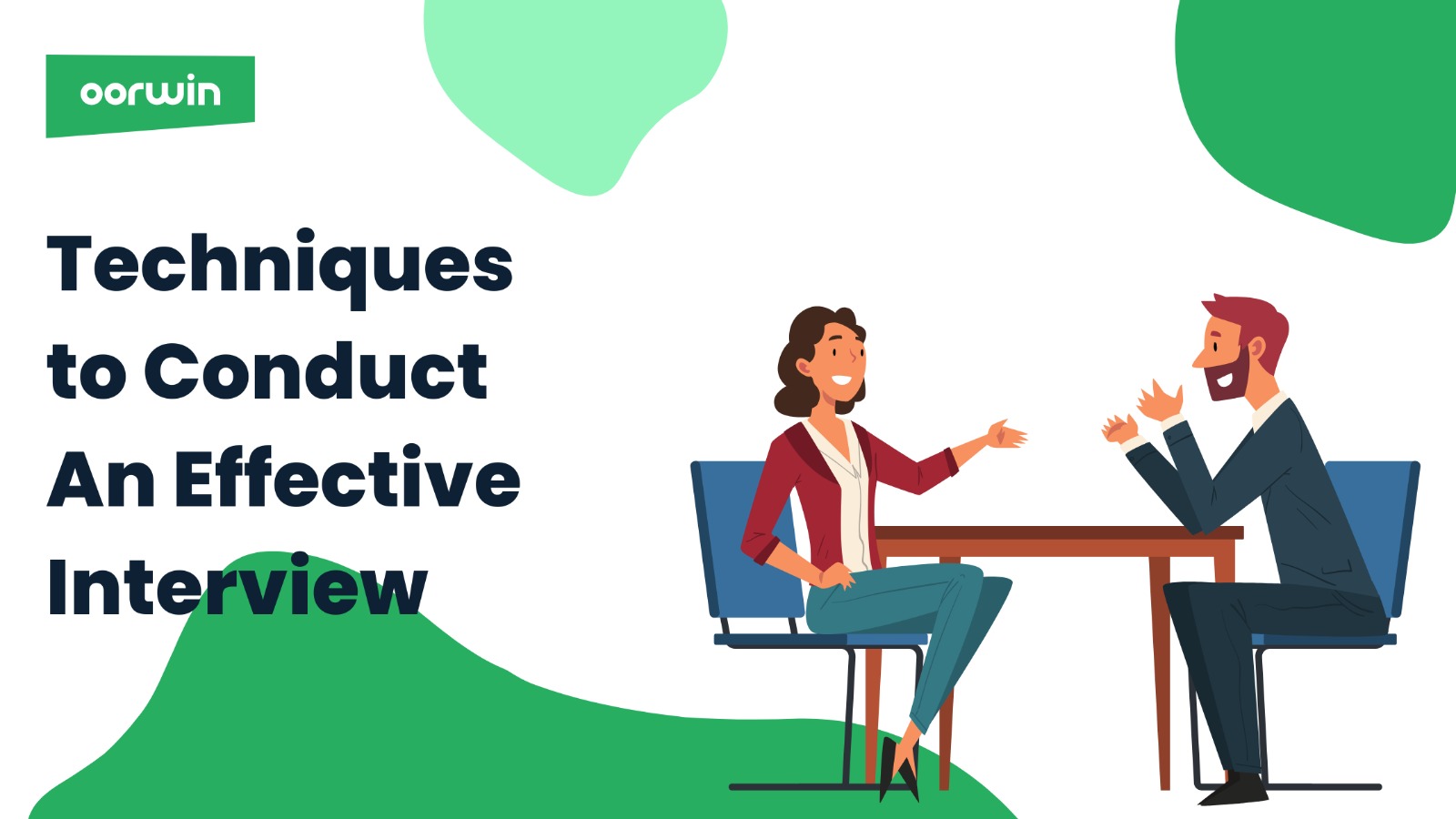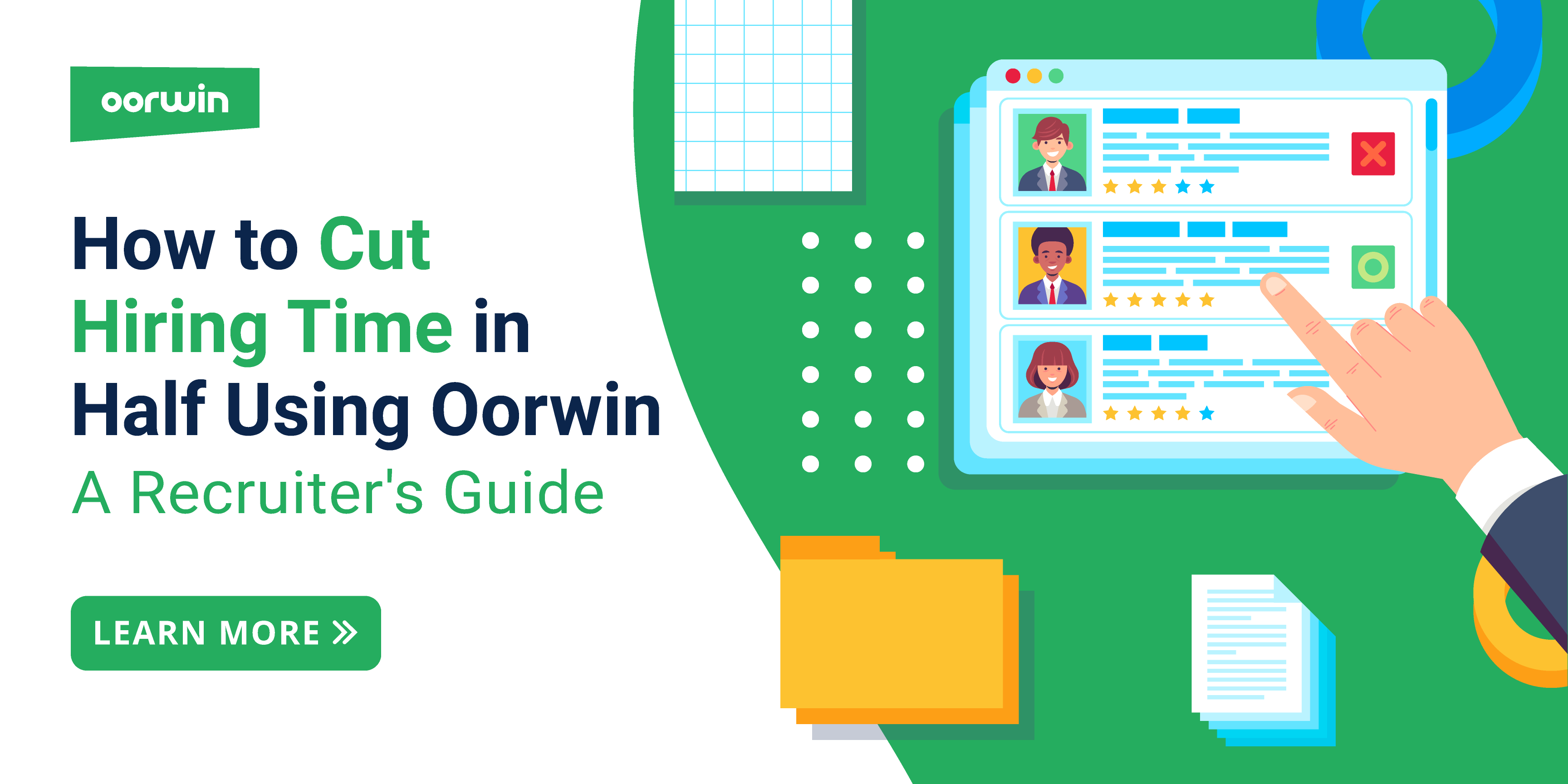Productive Techniques for Conducting a Job Interview
Oorwin
5min read / 28 Apr 2023

Related Articles
Optimizing Interview Strategies: A Guide to Conducting Effective Job Interviews
Conducting a good interview is essential for hiring the right person. To achieve this, it’s important to use smart interview strategies that ensure the process is smooth and seamless. By employing effective interview techniques, interviewers can ask the right questions and accurately assess candidates. In this guide, we’ll delve into various techniques and strategies crucial for conducting job interviews. From diligently preparing beforehand to thoughtfully asking insightful questions, these tips can significantly enhance the success and efficiency of your interviews.
Why Conducting Effective Interviews Are Crucial?
Conducting effective interviews is a key step in the hiring process, significantly influencing the outcome of an organization’s efforts to attract talent. This process extends beyond simply evaluating a candidate’s qualifications. It involves gaining insights into how well a candidate fits within the company culture, their work ethic, and the contributions they can make in the future. Here are some important reasons why conducting effective interviews is essential:
- Identifying the most suitable candidate: A well-conducted interview helps identify the candidate who best matches the required skills, qualifications, and cultural fit for the role, ensuring a successful hire.
- Enhancing the company’s reputation: An effective and professional interview process can positively impact the company’s reputation, attracting top talent and promoting a positive employer brand.
- Reducing employee turnover: By selecting the right candidate during the interview process, organizations can reduce employee turnover, leading to increased productivity, improved morale, and lowered costs associated with re-hiring and training.
- Saving time and resources: A streamlined and efficient interview process reduces the time and resources spent on hiring, allowing the organization to focus on other essential aspects of its operations.
- Ensuring a fair and unbiased hiring process: Effective interviews help minimize biases, ensuring the candidate selection process is fair, objective, and merit-based.
- Facilitating better decision-making: Effective interviews provide valuable insights into a candidate’s qualifications, skills, and experience, enabling hiring managers and recruiters to make more informed decisions when selecting the best candidate.
- Fostering a positive candidate experience: A well-organized and engaging interview process can create a positive experience for candidates, increasing the likelihood of them accepting a job offer and enhancing the organization’s reputation.
- Encouraging a Diverse Workforce: Thoughtful interviewing helps ensure hiring decisions are based on merit, fostering a diverse and inclusive work environment.
9 Effective Techniques for Conducting Job Interviews
Successfully conducting a job interview involves careful planning, effective communication, and insightful assessment. Below are nine strategies that can help elevate the quality of your interview process:
Preparation for Interviewers
Before diving into an interview, it’s crucial for interviewers to be well-prepared. This involves researching the candidate’s background, understanding their resume, and crafting thoughtful questions tailored to the role and the candidate. Additionally, setting up a comfortable and professional interview space can set the right tone for the conversation.
Write Engaging Interview Questions
The key to an effective interview lies in the quality of the questions asked. To create engaging interview questions, consider the following:
- Focus on open-ended questions that encourage candidates to share their thoughts, experiences, and skills. These questions help you understand a candidate’s thought processes and problem-solving abilities.
- Ask behavioral questions that require candidates to provide examples of how they’ve handled specific situations. This can give you a better understanding of their real-world experiences and capabilities.
- Include technical or job-specific questions to gauge a candidate’s expertise in the specific field.
Test Out Various Interview Formats
Different interview formats can elicit different information from candidates. Experiment with the following formats to find the best approach for your needs:
- One-on-one interviews help create a comfortable environment for candidates to share their experiences.
- Panel interviews, where multiple interviewers ask questions and provide varied perspectives on the candidate’s responses.
- Group interviews involve multiple candidates and can showcase how individuals interact with others in a team setting.
- Practical or skills-based interviews provide a more accurate measure of their abilities, where candidates complete tasks or assessments relevant to the job.
Get the Pitch Ready
In addition to evaluating a candidate’s qualifications, the interview process is also an opportunity for you to sell the company and the role. Prepare a pitch highlighting the company’s culture, values, and opportunities for growth. This can attract top talent and ensure that candidates have a clear understanding of the organization’s goals and vision.
Conduct Virtual Interviews
As remote work becomes more prevalent, virtual interviews have gained popularity. To conduct a successful virtual interview:
- Choose a reliable video conferencing platform and ensure all participants have a stable internet connection.
- Schedule the interview in advance, providing the candidate with clear instructions on how to join the virtual meeting.
- Test your equipment and troubleshoot any technical issues before the interview begins.
- Create a professional, distraction-free environment for the interview.
Maintain an Unbiased Approach
To ensure a fair and objective interview process, be mindful of any biases that might influence your decision-making. Some strategies to minimize bias include:
- Using a standardized set of questions for all candidates.
- Implementing a diverse panel of interviewers to provide multiple perspectives.
- Using structured interviews, each candidate is assessed using the same criteria and scoring system.
Communicate with Other Interviewers
When multiple interviewers are involved, it’s essential to communicate and collaborate effectively. Share your impressions and insights about each candidate, discuss the strengths and weaknesses observed during the interviews, and come to a consensus on the best fit for the role.
Create a Process for Evaluating Candidates
Establish a systematic approach to evaluating candidates based on predetermined criteria. This can include a scoring system or key performance indicators aligning with the role’s requirements. Consistency in evaluation helps reduce the impact of personal biases and ensures that the final decision is based on objective data.
Follow-Up Strategies
The process doesn’t end once the interview is over. Implementing effective follow-up strategies is key. Sending a thank-you email to candidates and providing timely feedback can leave a positive impression and maintain open lines of communication.
Common Mistakes to Avoid While Conducting a Job Interview
Conducting a job interview is a delicate process, and avoiding common pitfalls is essential for a successful outcome. Here are some mistakes to steer clear of:
- Rushing the interview: Allocate sufficient time to thoroughly assess the candidate. A hurried interview may lead to overlooking important details.
- Not preparing adequately: This can lead to ineffective questions and a poor assessment of the candidate’s suitability for the role.
- Letting biases influence your decision: Be objective in your assessment to ensure a fair hiring process.
- Failing to provide a positive experience: An unorganized or unfriendly interview process can deter talented candidates and negatively impact your employer brand.
- Overlooking soft skills: Neglecting to evaluate a candidate’s communication, teamwork, and problem-solving skills can result in hiring someone who may struggle in a collaborative environment.
Elevate Your Interview Process with Oorwin
Talent acquisition is a competitive landscape that requires mastery of the art of conducting effective interviews. Utilizing the techniques outlined in this guide and avoiding common pitfalls, organizations can significantly enhance their ability to identify and secure the right candidates. From preparation to follow-up, each step in the interview process is an opportunity to refine and perfect your approach.
Oorwin’s Integrated Talent Management Platform can be a valuable ally in this endeavor. By streamlining your recruitment processes and providing tools for efficient candidate management, Oorwin ensures you can focus on conducting insightful interviews and making informed hiring decisions. Explore how Oorwin can support your organization in conducting successful job interviews and elevating your talent acquisition strategy.
Frequently Asked Questions
What Makes an Effective Interview?
An effective interview accurately assesses a candidate’s qualifications, skills, and fit for the role. It involves engaging questions, a structured evaluation process, and a professional and unbiased approach, and it serves as an opportunity to showcase the organization’s culture and values.
What Types of Questions Should I Ask When Conducting an Interview?
Ask a mix of open-ended, behavioral, and technical questions. Open-ended questions encourage candidates to share their thoughts and experiences. Behavioral questions require candidates to provide examples of past situations, and technical questions assess a candidate’s expertise in a particular field or job function.
What Are Effective Interview Techniques?
Effective interview techniques are strategies and methods interviewers use to assess a candidate’s qualifications and fit for a role. They include crafting engaging questions, testing various interview formats, preparing a pitch to showcase the company, conducting virtual interviews, adopting an unbiased approach, collaborating with other interviewers, and creating a systematic process for evaluating candidates.
Why is conducting an effective interview important?
Conducting effective interviews is important as it helps identify the right candidate, enhances the company’s reputation, reduces employee turnover, and saves time and resources.
Popular Articles..
Blog

7min read / 25-Jun-2025
Master Effective Interview Techniques with Oorwin: A Step-by-Step Recruiter’s Guide
Blog
Blog
Get the latest Oorwin releases, updates, success stories & industry news
 Back
Back
